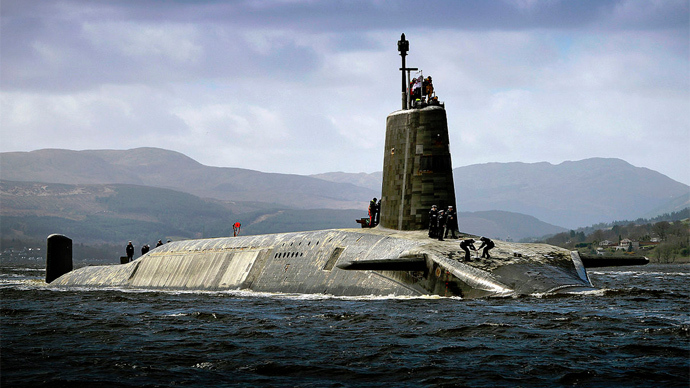Nuclear safety incidents soar 54% at UK’s Clyde sub base & arms depot

The number of “nuclear safety events” at Britain’s submarine base and warhead depot at the Clyde has drastically soared according to official records that showed 105 incidents in 2013-2014, compared to just 68 in the previous period.
Almost all of the incidents involved the reactors on Trident and other nuclear subs at the Faslane Naval Base, while six involved nuclear weapons stored at Coulport armaments depot.
Ministers were forced to disclose the information after a question in parliament by Angus Robertson from the Scottish National Party (SNP) who leads the party’s parliamentary group in Westminster.
Only 45 of the latest incidents were level C events, meaning there was a “moderate potential for future release or exposure, or localized release within a designated radiological controlled area.” The remaining 60 were classed as level D defined as “low potential for release – but may contribute towards an adverse trend producing latent conditions.” According to the records, the base has not recently suffered from any of the more serious Category A or B safety failures.
READ MORE: 'Wrap up Trident!': Protest in London against £100bn nuke replacement plan
Overall in the past six years the Clyde naval base suffered nearly 400 “widespread” safety events, according to official records. Twelve of these cases were listed as “Category B” incidents meaning there was an “actual of high” risk of exposure to radiation or that there was a release of radiation which was contained within a submarine or a building.
Robertson, whose party wants the complete removal of nuclear weapons from Scotland, asked the MoD to explain what was being done to improve safety measures especially as construction work is underway for Faslane to house all of Britain’s nuclear submarines, some of which are currently in Devonport, Plymouth.
“A near doubling in the number of nuclear safety incidents within a year is totally unacceptable and needs urgent answers from the MoD. It's important to note this doubling has occurred before expansion work at the base for more nuclear submarines is complete,” he said.
READ MORE: Ban the bomb! Anti-nuclear MPs debate Trident, call renewal ‘waste of money’
But the government maintained that the vigorous culture of reporting any incidents as well as putting them in the public domain ensured that there was never any threat to personal or the environment. The details of the incidents were not disclosed, but MoD insisted all of them were “minor issues,” such as incorrect labeling or not filling the incorrect form as required by standard procedures.
“This comprehensive, independent recording process allows Clyde to maintain a robust reporting culture, undertake learning from experience and to take early corrective action,” the UK Defence Minister, Philip Dunne, told MPs.











